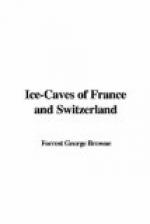When we arrived at the farmhouse at the Col de Vassieux, we reaped full benefit from our ice. The wine, which had been hot and heavy and unpalatable in the morning, when we had tried it unmixed, became delightfully refreshing when disguised with an abundance of water and sugar and ice; and Liotir found that contracting for my keep at a low rate would not, after all, secure him the comfortable income he had before calculated. After this refreshment, he became communicative, and told me he had served seven years in the French army, three of which were spent in working on railways. He had fought the Italian campaign, and was full of details of the battle of Solferino, on which occasion his bataillon was led on by the Emperor in person. According to his account, four bataillons were drawn up for the assault of a tower, and when the first advanced it was swept away to a man. The second met with a like fate, and Liotir was in the third. His officers had all been killed, and a corporal was in command. The Emperor rode up and called to them to advance as far as he advanced. This was about a hundred yards; and then, after halting them for a moment, the Emperor cried, ’Allez, mes enfants! nous ne sommes pas tous perdus!’ sending the fourth bataillon close upon their heels. In answer to my question, Liotir said, slowly and solemnly, that he did not think the Emperor was under fire; a few dropping shots reached them while he was yet addressing them, but he believed the Emperor Napoleon was not in the fire at Solferino. I took the opportunity of asking whether he was green on that occasion, as Mr. Kinglake believes that he is in times of personal danger; but my companion utterly scouted the idea, and declared that he saw no man through all that day so cool and capable as the Emperor. Pale he undoubtedly was, but that was his habit. Like all other French soldiers with whom I have had much conversation, Liotir complained of the army arrangements in the matter of food; on all other points he was most amiable, but when he spoke of the extortions of the cantiniere he completely lost his temper. At a cafe, the soldiers could get their cup for 15 centimes, or 20 with liqueur; whereas the cantiniere charged a franc, and gave them very bad coffee. Wine, too, which would cost them 60 centimes the kilo in the town, was valued at 2 francs by their grasping enemy. He had an idea that English soldiers are allowed to take their whole pay in money, and spend it as they will; whereas the French foot-soldier, according to his account, gets 25 centimes a day in money, and has everything found except coffee. A young trooper at Besancon was very eloquent on this subject. He represented himself as a man of small appetite and a gay spirit; he could well live on very little solid food, and yet he had as much deducted from his pay on that account as anyone in the army—as much, for instance, he groaned, as a certain stout old warrior who was then reposing on a corn-bin. If he could have drawn all his pay in money, and lived on almost nothing for food, he would have had abundance of sous for cards and tobacco; and what a career would that be!




